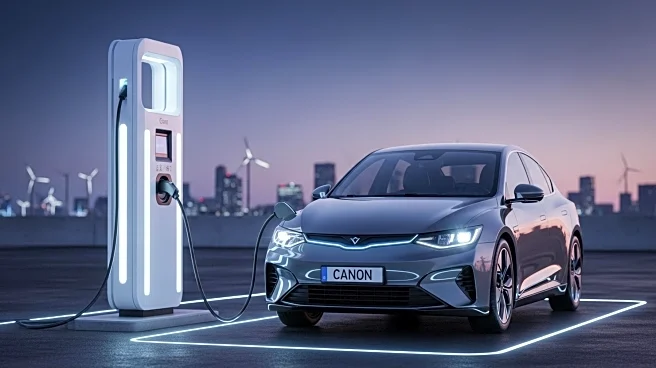What is the story about?
What's Happening?
As the US electric vehicle (EV) tax credit nears its phase-out, automakers are preparing for a potential surge in sales. The tax credit, which offers significant savings to buyers, is set to expire soon, prompting a rush among consumers to purchase qualifying EVs. The credit applies to vehicles with a manufacturer's suggested retail price (MSRP) not exceeding $80,000 for vans, SUVs, and pickup trucks, and $55,000 for other vehicles. This has led to increased interest in models from brands like Tesla, Chevrolet, Ford, and Nissan, which have vehicles that meet these criteria. The third quarter is expected to see a notable increase in sales as buyers seek to take advantage of the remaining tax incentives.
Why It's Important?
The expiration of the EV tax credit is a significant event for the automotive industry, particularly for manufacturers of electric vehicles. The credit has been a crucial factor in making EVs more affordable and attractive to consumers, thereby driving sales and supporting the transition to cleaner transportation. As the credit phases out, automakers with qualifying models stand to benefit from a last-minute sales boost. This situation highlights the importance of government incentives in promoting sustainable technologies and could influence future policy decisions regarding support for electric vehicles. The outcome of this sales surge will also provide insights into consumer demand for EVs without the tax credit, potentially impacting future production and marketing strategies.
What's Next?
With the tax credit set to expire, automakers are likely to ramp up production and marketing efforts to capitalize on the increased demand. Companies like Tesla, which have significant production capacity, may see substantial sales growth. Meanwhile, other manufacturers will need to assess their ability to meet the heightened demand. The sales data from this period will be closely watched by industry analysts and policymakers to gauge the impact of the tax credit on EV adoption. Additionally, the results could influence future legislative discussions on renewable energy incentives and the role of government in supporting the transition to electric vehicles.















